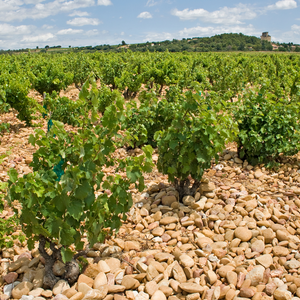The Rhone Valley wine region is located in southeastern France, and it is one of the most famous wine regions in the world. It stretches for over 200km from Lyon to the Mediterranean, and it is divided into two distinct areas: Northern Rhone and Southern Rhone. The region is known for producing high-quality, full-bodied red wines and aromatic white wines.
Northern Rhone:
The Northern Rhone is known for producing some of the world's finest red wines from Syrah grape, with a unique character and structure that are difficult to replicate elsewhere. The vineyards are steep, and the soil is made up of decomposed granite mixed with some clay, which contributes to the wine's unique mineral character. The weather in the Northern Rhone is relatively cool, with long, dry summers and harsh winters. Winemakers in this region use traditional winemaking techniques, including extended maceration and aging in oak barrels, to produce wines with high tannins, firm structure, and great aging potential.
There are several appellations within the Northern Rhone, including Cote-Rotie, Hermitage, Crozes-Hermitage, Saint-Joseph, and Cornas. The wines from Cote-Rotie are known for their elegance and finesse, while the Hermitage wines are full-bodied and rich. The wines from Crozes-Hermitage are more approachable and affordable, while the Saint-Joseph wines are known for their intensity and complexity. The wines from Cornas are full-bodied and spicy, with a distinct black fruit flavour.
Southern Rhone:
The Southern Rhone is known for producing full-bodied, fruity, and aromatic red wines, which are usually blended from several grape varieties, including Grenache, Syrah, and Mourvedre. The soil in the Southern Rhone is made up of a combination of sand, clay, and limestone, which gives the wines a unique mineral character. The climate in the Southern Rhone is warm and sunny, with mild winters and hot summers, which makes it ideal for growing grapes. Winemakers in this region use traditional winemaking techniques, including whole-cluster fermentation and aging in large oak barrels or concrete tanks, to produce wines with a rich, fruity character.
One of the unique features of the Southern Rhone region is the presence of large, rounded stones known as "galets." These stones, which can range in size from a golf ball to a watermelon, cover the vineyard floors and have a significant impact on the wine produced in the region.
The galets are thought to have been deposited in the region by the Rhone River thousands of years ago, and they are made up of a combination of granite, quartz, and limestone. They serve several important purposes in the vineyard, including regulating the soil temperature, retaining moisture, and preventing erosion.
The galets also have a significant impact on the flavour and character of the wines produced in the region. They reflect the sun's heat back onto the vines, providing additional warmth and contributing to the ripening of the grapes. The stones also help to drain excess moisture from the soil, which can help prevent over-ripening and maintain a balance of flavours in the grapes.
Winemakers in the Southern Rhone have learned to work with the galets to produce wines with a unique character and flavour. The stones can make it difficult to plant and harvest the grapes, so winemakers often use specialized equipment to work around them. They also carefully manage the irrigation and pruning of the vines to ensure that the grapes ripen evenly and develop the desired flavour profile.
There are several appellations within the Southern Rhone, including Chateauneuf-du-Pape, Gigondas, Vacqueyras, and Cotes du Rhone. The wines from Chateauneuf-du-Pape are known for their complexity and elegance, while the Gigondas wines are full-bodied and spicy. The wines from Vacqueyras are fruity and approachable, while the Cotes du Rhone wines are versatile and easy to drink.
In conclusion, the Rhone Valley wine region is home to some of the most famous and highly-regarded wines in the world. Whether you prefer full-bodied, tannic red wines or fruity, aromatic whites, there is a wine for everyone in the Rhone Valley. The unique terroir, weather, and winemaking techniques used in this region contribute to the character and flavour of each wine, making them truly unique and worth exploring.

